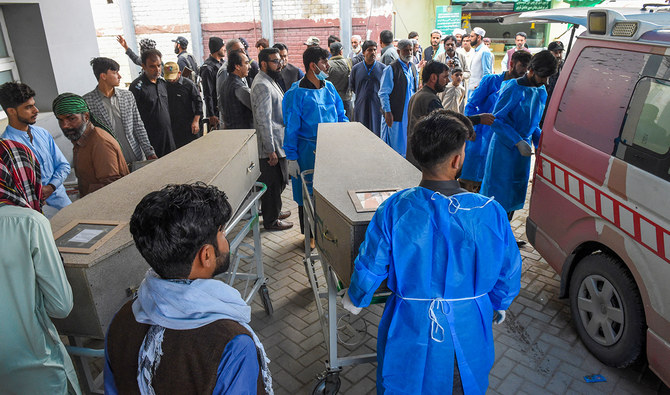QUETTA, Pakistan: Pakistani police searched for gunmen who killed nine people after abducting them from a bus on a highway in the country’s southwest. The same attackers earlier killed two people and wounded six in another car they forced to stop.
The abductions took place on Friday in Balochistan province, which has long been the scene of an insurgency by separatists fighting for independence.
The outlawed Baloch Liberation Army claimed responsibility for the attack. It said it had information from sources that plain-clothed spies were on the bus, according to a statement from the group.
The gunmen killed the nine men after checking their ID cards to ensure they were intelligence officers.
The group offered no evidence to support the allegation that spies were on the bus.
Earlier Saturday, deputy commissioner of police Habibullah Mosakhail said the gunmen had set up a blockade, then stopped the bus and went through the passengers’ ID cards. They took nine people with them, all from the eastern Punjab province, and fled into the mountains, he said.
Police later recovered nine bodies under a bridge about 5 kilometers (3 miles) from the highway.
On Friday, the same gunmen had opened fire at a vehicle that failed to stop for their blockade, killing two and wounding six, police said.
A search for the perpetrators was underway, Mosakhail said. The bus was heading from the provincial capital of Quetta to Taftan, a town bordering Iran.
Witness Sajjad Ahmed, who was a passenger on the bus, said there were 70 people on board. Masked men stopped the vehicle near the city of Nushki, took away nine people and told the driver to continue the journey, he told reporters.
“We heard the armed men open fire on those people as we drove away,” said Ahmed. “We heard the sounds of firing. The driver took the bus to the closest police station. We didn’t know if those people were alive or not.”
Another passenger, Mohammad Tahir, said the gunmen who boarded the bus had targeted people from Punjab. “They said, ‘Get up from your seats whoever is from Punjab,’” said Tahir.
They asked the standing passengers if they were from that province and then swore at them.
“’You kill our children,” said Tahir, quoting the gunmen. ‘“You do bad things to us.’“
An initial police report said that 19 of the passengers were traveling to Iran on their way to Western countries as migrants. The report, shared with The Associated Press, said that two of those abducted and killed were human smugglers.
Punjab has emerged as a hotspot for Pakistanis trying to make the perilous journey to Europe hoping for a better life there.
Pakistani Prime Minister Shehbaz Sharif condemned the attack, expressing his “deep sorrow and regret over this shocking incident.” He offered his condolences to the families of the victims and said he stood by them in their hour of grief, according to a statement from his office.
“The perpetrators of this incident of terrorism and their facilitators will be punished,” Sharif said.
Abductions are rare in Balochistan, where militants usually target police forces and soldiers or infrastructure.
Although the government says it has quelled the insurgency, violence in Balochistan has persisted and the bus attack is the latest incident in the restive region.
Authorities are also struggling to contain militancy in other parts of the country.
In the northwest province of Khyber Pakhtunkhwa, the army said Saturday that two soldiers were killed in a gunfight with militants in Bunar district.
In a statement, the army said a high-profile Pakistani Taliban commander was also killed. He was involved in activities against security forces, extortion and the targeted killing of civilians, according to the statement.
A spokesperson for the Pakistani Taliban, Muhammad Khorasani, paid tribute to the slain commander.












